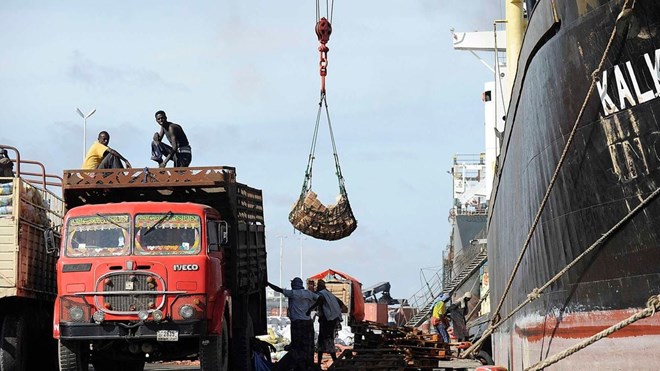
Wednesday September 27, 2023

Porters offload goods in the sea port of Mogadishu, Somalia on April 24, 2013. PHOTO | AFP
A businessman who was being investigated for allegedly illegally shipping military equipment and explosives seized at Mogadishu Port in Somalia last month has disappeared.
Through their lawyer, the family claim that Zakariya Kamala Sufi Abashiekh was arrested on September 5 by individuals claiming to be police officers from the Anti-Terror Police Unit (ATPU). He has not been seen since.
When he appeared in court in May, the businessman and the state expressed concern for his safety due to threats he had received from unidentified individuals in Somalia.
The state had suggested that Abashiekh would be safer in custody.
The family represented by lawyer Jared Magolo, has petitioned the High Court in Mombasa to release the businessman. Despite visiting various police stations, the family said they have been unable to locate him."I have made enquiries and visited the ATPU offices at the regional headquarters, but Abashiekh is nowhere to be found and the officers are not giving any information," said Magolo.
Abashiekh, who is free on Ksh1 million ($6,770) bail, was due to appear in Shanzu Court on September 22 but failed to show up.
"The family and friends are worried about his safety. I am therefore compelled to seek orders for his appearance in court or his release," Magolo said in the document filed before Justice Ann Ong'injo.
The government has been given two weeks to respond to the application.
Abashiekh is alleged to have helped ship the military equipment from China to Al Shabaab in Somalia before the items were seized.
He was first arrested on April 28 at Mama Ngina Water Front in Mombasa County. He was then taken to Shanzu Court to be remanded in custody pending investigations into his involvement in the shipment and delivery of the items to the militants.
In an affidavit submitted to the Shanzu Court, the state alleged that the businessman had purchased military equipment from China on behalf of Al Shabaab and facilitated its transport to Somalia.
Seized materials
The shipment seized at Mogadishu Port included five advanced JS crop drones, capable of carrying 10 litres of liquid up to 500 metres above sea level and covering an area of 10 hectares.
Also found were rifle scopes, materials for military uniforms, canvas for tents, night vision goggles, swim goggles, voice recording pens, spy goggles and watches, military-grade two-way radios, helmets, ghillie suits (camouflage), portable solar panels, flashlights and batteries.
The state through the Directorate of Criminal Investigations (DCI) and the Office of the Director of Public Prosecutions (ODPP), has requested legal assistance from both Somalia and China in order to gather evidence and testimony on the origin of the cargo.
On May 19, Somalia's government announced the seizure of the weapons cache at Mogadishu Port and Airport. The weapons were hidden in containers disguised as legitimate goods.
Following the seizure, 10 people linked to a smuggling network were arrested.
The state linked Abashiekh to the seized goods, alleging that he was acting as an agent for a terrorist group. Prior to his arrest, information had been received about his links with militants.
It was alleged that he had provided logistical support to the terrorist organisation Al Shabaab in Somalia and was in the process of transporting a suspicious container from China to Somalia.
During the trial, details were presented, including information retrieved from his mobile phone and his confession to a multi-agency team. These revealed that he had sent container number MSMU826114145G1 to a shipping company bound for Somalia. This was the same container intercepted by Somali authorities containing the military equipment.
Corporal Gideon Wambua linked the businessman to serious crimes in Kenya and the surrounding region. The state alleges that he has associates in Somalia and China who are yet to be arrested.
The state also alleges that the businessman, with the help of his associates in Somalia and China, procured the weapons and used third-party online payment platforms such as WeChat and Alipay to make the payments.
The businessman is currently under investigation for his alleged involvement with a terrorist organisation and for providing resources for the commission of terrorist acts. Investigators are examining his bank accounts and M-Pesa transactions to trace the financial trail.
The businessman denies the allegations and claims that no evidence has been presented to link him to the militants. He admits to sending a consignment from China to Somalia but denies that the items listed by the state are those he supplied.